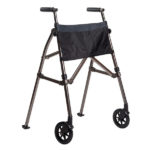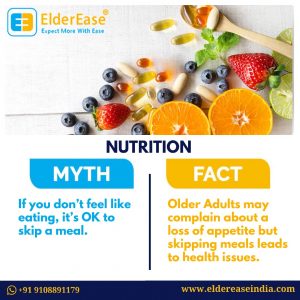
1. Myth: If you don’t feel like eating, it’s OK to skip a meal.
Fact: Loss of appetite is a common complaint of many senior citizens but skipping meals is not okay as it invites many health problems. People tend to gorge on high-calorie, nutrient-poor snacks between meals. Skipping meals can also cause blood sugar levels to fall too low; then when you do eat a big meal, they can surge too high. It can also suppress appetite.
Advice: Always start your day with a healthy breakfast since appetite is usually best in the morning and make sure to eat something at every mealtime and at regular intervals.
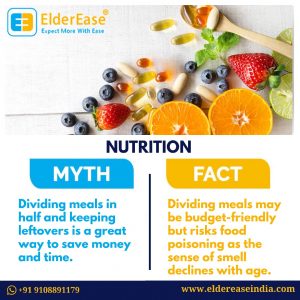
2. Myth: Dividing meals in half and keeping leftovers is a great way to save money and time.
Fact: Storing leftovers may be budget-friendly but not a great option. Leftover food can go stale and as the sense of smell declines with age, seniors may not understand if food is spoiled. This can risk food poisoning.
Advice: Make sure to keep your kitchen clean, cook foods thoroughly, refrigerate leftovers as soon as possible and not consume food more than a day old.
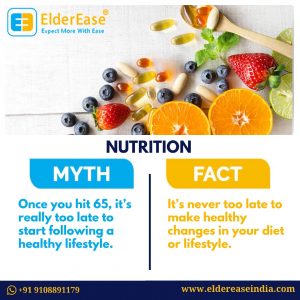
3. Myth: Once you hit 65, it’s really too late to start following a healthy lifestyle.
Fact: It’s never too late to make healthy changes in your diet or lifestyle. Older adults with insulin resistance can prevent/delay type 2 diabetes by eating more whole-grain foods, fruits and vegetables, and becoming more physically active. For people who have already faced a heart attack, change in lifestyle can reduce the risks of another heart attack
Exercise and a healthy lifestyle also reverses the accumulation of cholesterol-laden plaque in the arteries.
Advice: Aim for at least 30 minutes of physical activity on most days of the week. Create a calming space, dedicating enough time for sleep and practicing relaxation techniques.
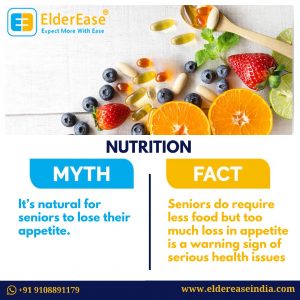
4. Myth: It’s natural for seniors to lose their appetite.
Fact: It’s true that seniors need less food due to metabolic changes but a sudden loss in appetite is a sign of concern. Decreased sense of taste or dental problems can cause seniors to eat less though their appetite hasn’t decreased.
Advice: Seniors should weigh themselves (or be weighed by their caregivers) periodically to look for changes. Any sudden weight loss should be seen as a red flag and warrants a visit to the doctor.
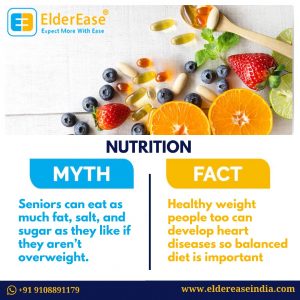
5. Myth: Seniors can eat as much fat, salt, and sugar as they like if they aren’t overweight.
Fact: People who are a healthy weight can still develop conditions like diabetes and heart disease from eating too many high-fat and sugar foods. Even seniors who are attempting to gain weight should eat a balanced diet rather than fill themselves with foods that are high in fat, salt, and sugar or low in nutrients.
Advice: Maintain a diet high in fruits, vegetables, whole grains, olive oil, and fish, and low in meat, sugar and processed foods. This will help the cells to function better.



